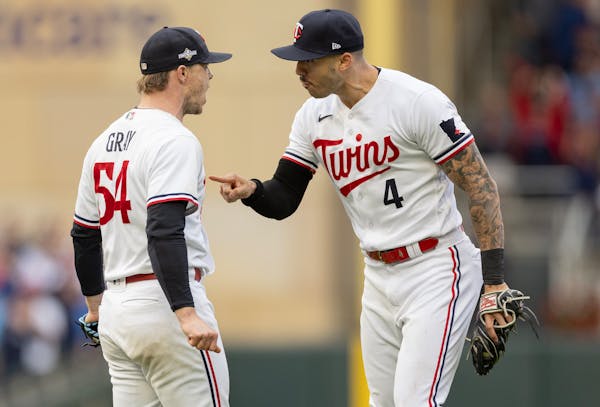Rocco Baldelli talked about Carlos Correa before Game 2 of the Twins playoff series as if his shortstop is a Jedi master who sees things in a different dimension than other ballplayers.
Toronto's Vladimir Guerrero Jr. likely agrees.
Correa pulled a fast one on ol' Vlad with a Houdini trick that should have caused Guerrero to check his pockets to see if he still had his wallet.
One day after executing an astonishing defensive gem bound for a time capsule, Correa completed a successful pickoff to kill a rally and help the Twins advance in the postseason with a 2-0 win and sweep of the Toronto Blue Jays as Target Field shook from noise and jubilation.
This is why the Twins invested $200 million in their superstar shortstop. For these moments. The big stage. The pressure moments when a team looks to its best players to do something special.
Correa delivered and then some, despite dealing with a painful case of plantar fasciitis in his left foot.
His RBI single in the fourth inning proved to be the decisive hit in Game 2 and he altered both games with his defense.
"Superstars show up in the biggest moments," said Game 2 winner Sonny Gray, who teamed with Correa for the biggest out of the game.
In the fifth inning, the Blue Jays had runners on second and third with two outs trailing 2-0. On a full count to cleanup hitter Bo Bichette, Correa sneaked in behind Guerrero. Gray wheeled and picked him off.
Threat over.
"The awareness that he has in big moments and big games is a special trait that he has," Gray said.
Correa saved one run and prevented a potentially big inning in Game 1 on a play that former Twins shortstop Roy Smalley described in a tweet as "one of the best plays I've seen a shortstop make … ever."
Correa hustled from his spot close to second base to grab a slow roller that got past Jorge Polanco charging in from third. Bichette tried to score from second, but Correa barehanded the ball and threw an off-balance laser that beat Bichette to the plate.
"That's a play that you're probably not going to have to make ever again in your entire life," Baldelli said. "Some guys play 20 years and never have to make that play. It was a play that I think we will see forever. In Twins history, I think that play is not going to go away. Some plays we start to see less of as time goes on. That one is going to stick."
Twins President of Baseball Operations Derek Falvey, soaked in beer and champagne in the clubhouse celebration, compared Correa's play to Derek Jeter's famous flip to home in the Yankees playoff series against the Oakland A's in 2001.
"When you watch that replay and watch what he did," Falvey said of Correa, "it's just the most incredible play."
By his own admission, Correa had a disappointing season at the plate. No one will dispute that. He hit into 30 double plays and his .230 batting average was a career low.
But this is October, and how he performs this month is what everyone will remember. So far, he's played like a true superstar.
"The plays Carlos has been making the last couple of days have been unbelievable," rookie sensation Royce Lewis said. "He's putting on a show. I've watched him all year. It's a front-row seat to someone that I lived my life trying to imitate and be just like him and be a shortstop."
Correa is a human vacuum in the field. He makes difficult plays look routine, so smooth and effortless. Pitchers must love knowing they have a safety blanket behind them.
"He sees things before they happen," Baldelli said. "That's how Carlos Correa plays the game. He envisions things. He envisions not one or two scenarios and what could happen here or there. He sees many things very quickly, makes quick decisions and then executes."
He used those Jedi senses to change both games in the series. This is why the Twins gave him the largest contract in team history — to shine when the playoff moment presents itself.








